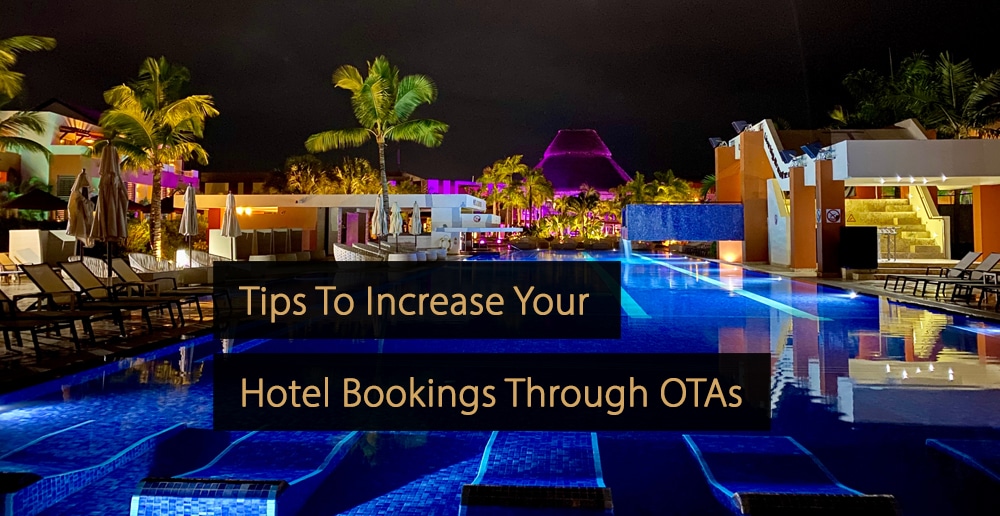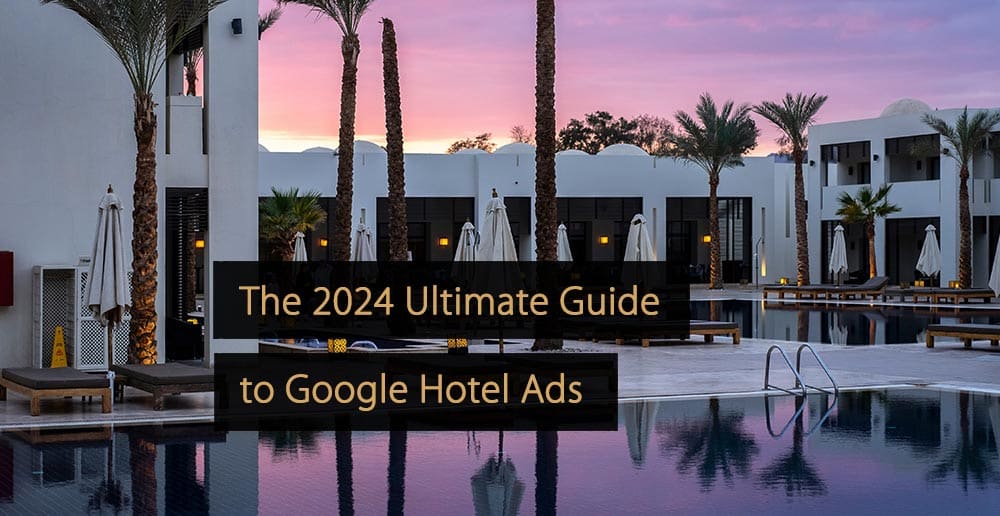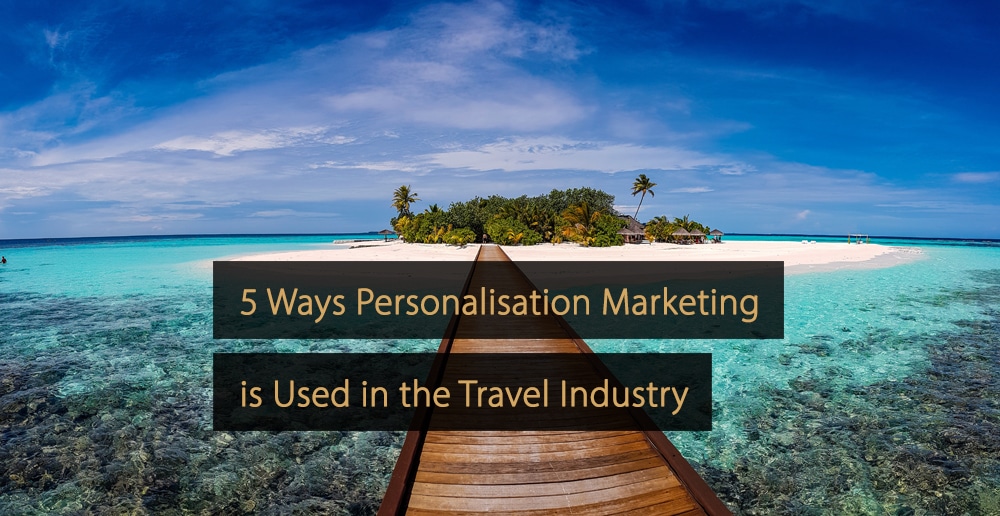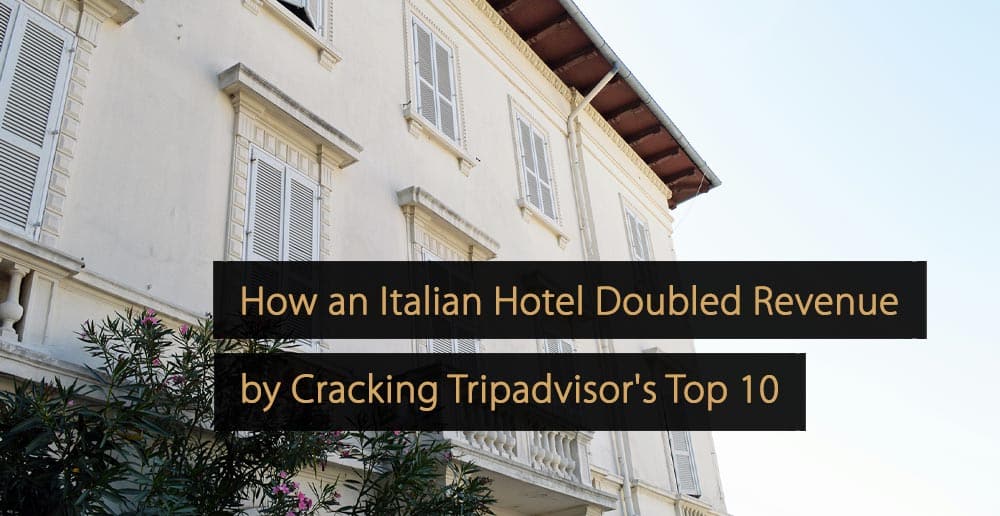Maximizing demand for rooms is a vital component of revenue management and long-term business success for hotels, and online travel agents, or OTAs, can be ideal for achieving this. However, hotel owners, marketers, and revenue managers must work to get the most from them. In this article, you will find out more about what an OTA can do for you and 10 tips for increasing the number of bookings you generate through these platforms.
Table of Contents:
- What Does OTA Stand For?
- Why Are OTAs Important?
- 11 Tips to Increase Your Hotel Bookings Through OTAs
- 1. Find the Right OTA Mix
- 2. Use a Distribution Channel Manager
- 3. Build a Relationship with Market Managers
- 4. Use Amazing Photographs
- 5. Stand Out With Your Hotel Description
- 6. Know Your Competition
- 7. The Right Price for The Right Moment
- 8. Manage Guest Reviews
- 9. Make Use of OTA Promotion Opportunities
- 10. Continually Review Your OTA Results
- 11. Use the Specific Marketing Tools Some OTAs Offer
- List of OTAs to Increase Your Hotel Bookings
- What are Hotel Metasearch Engines?
- Use the Expedia Extranet to Increase OTA Bookings
- OTAs vs. Your Hotel Website
What Does OTA Stand For?
OTA stands for an online travel agent and refers to a website or online platform that allows customers to purchase travel-related products or services. Examples include travel packages, hotel bookings, flight tickets, activity bookings, and car rentals. As such, OTAs function similarly to store-based travel agents, albeit with more self-service options.
It is important to understand that an OTA operates as a link between vendors and customers, selling hotel rooms and other travel products on behalf of third parties, rather than selling their own travel products. Some of the most popular examples of OTAs include Expedia, Booking.com, and Hotels.com.
Why Are OTAs Important?
Online travel agents are important because they allow hotels to communicate with customers who may otherwise be out of reach. From a customer perspective, an OTA also serves as a comprehensive travel platform, potentially allowing them to find hotels, arrange flights, read reviews and make hotel bookings, all from a single location. This makes OTAs very popular, and hotel owners must try to meet customers where they are.
11 Tips to Increase Your Hotel Bookings Through OTAs
While OTAs are a key distribution channel in the modern age, they do not guarantee success independently, and it is important to adopt some best practices. Below, you will find 10 tips to help you increase hotel bookings.
1. Find the Right OTA Mix
A vital first step is to make sure you find the right OTA mix, so that you are reaching your target audiences. This means taking the time to research different OTAs and then partnering with the right ones. It also means managing distribution to optimize both revenue and profit for your hotel.
The main things to understand here are that one OTA might offer better access to the market in North America. In comparison, another might offer better access to European or Asian customers. Different OTAs might appeal to millennials than those that appeal to Gen X. Try to make sure your OTA mix allows you to find the customers you need to reach.
2. Use a Distribution Channel Manager
A hotel distribution channel manager is an application that enables you to manage your various distribution channels from a central point. Using one can help you avoid situations where you need to access each OTA individually, one by one, to adjust things like room rates or availability.
This can help facilitate a far more dynamic pricing strategy, where you can adjust prices on a single OTA, or all OTAs simultaneously, depending on what you are trying to achieve. The ability to do this quickly and effortlessly, in real-time, makes it far easier to respond to spikes or dips in demand for your hotel rooms.
3. Build a Relationship with Market Managers
While online travel agents offer many self-service options for customers, those in the hotel industry need to recognize the human element of working with an OTA. A major example of this involves developing a good relationship with market managers. Doing so may require you to invite market managers to your hotel, or go to lunch with them.
In return, market managers will be more willing to work with you, helping you to devise promotional strategies and spot trends related to your hotel, which can help you to understand where you are going right and where you are going wrong. A market manager has the power to drive demand to your hotel, so make it worth their while to do so.
4. Use Amazing Photographs
When selling your hotel to potential customers, a picture is worth a thousand words. High-quality photographs can help you make a great first impression and allow you to highlight what your hotel has to offer clearly. Yet, there are a few best practices to remember when creating hotel images.
Use the best possible equipment and identify the best parts of your hotel. Take photos that show people enjoying your hotel, rather than showcasing empty rooms, and take the time to arrange things the way you want them if you are taking photos outside, time it to highlight either excellent weather or atmospheric nighttime views.
5. Stand Out With Your Hotel Description
While using an OTA, customers are likely to look at more than one hotel, which means you need to make yours stand out. Aside from promoting its qualities using photos, your description plays a key role. You need to clearly describe the type of hotel you operate and what it offers, but you should also try to be creative.
Think about the type of customer(s) you are targeting and speak to them. If you are targeting families, make sure your description says you are “family-oriented”. Remember, you do not need to stick to describing the hotel alone. Talk about the nearby attractions and promote that your hotel offers easy access.
6. Know Your Competition
The hotel industry is extremely competitive, and your hotel and main rivals will likely be vying for the same customers on the same OTAs. For this reason, it is important to take the time to get to know your competition and understand what they have to offer customers.
This can involve independent research, checking online feedback, and monitoring prices. You want to be sure you are not over-pricing or under-pricing your rooms, based on what similar hotels charge. Moreover, if you can identify problems with rival hotels, you can start to appeal to the people they are letting down.
7. The Right Price for The Right Moment
Adopting the right pricing strategy is crucial for increasing hotel bookings through OTAs, and you must charge the right price for the right moment. Two main pricing strategies involve setting your prices based on demand, and maintaining price parity across all distribution channels.
The former strategy involves forecasting demand, based on past data, current bookings, and wider industry trends. At times of higher demand, you can charge more, while lowering prices when demand is low can help to fill your hotel. Price parity (same rates for the same room on all the distribution channels, including your own website) is essential for being accepted onto some OTA platforms. Still, you do need to be careful when setting your standardized rate, as different OTAs will charge you different commissions for the same room rates.
8. Manage Guest Reviews
Many customers read online reviews before booking, so you must take the time to manage your guest reviews. There are several ways to achieve this, from delivering an excellent customer experience, encouraging your guests to leave reviews, and responding to feedback.
Try to identify any common complaints quickly and work to resolve the issues. Ensure you keep all information about your hotel up-to-date, so people do not have false expectations, and try not to get unnecessarily defensive. It is better to admit your mistakes and strive to improve than blame the customer or deny the problem exists.
9. Make Use of OTA Promotion Opportunities
One of the ways those in the hotel industry can take full advantage of what online travel agents have to offer is by capitalizing on some of the available special offers. This can be especially important during periods of low demand, where ensuring rooms are occupied becomes the main priority.
Examples of some of the promotional opportunities available include paying for higher placement on OTA search engines, or running ad campaigns to target specific demographics at specific times. You may also be able to pay higher commissions in exchange for greater exposure or join special deal promotions offered by some OTAs.
10. Continually Review Your OTA Results
Finally, even when following the tips provided, you will unlikely create the perfect OTA strategy the first time you ask. It is, therefore, imperative to continually review your results to have a clear idea of how your hotel is performing, what is going right, and where there is room for improvement.
Take the time to monitor results and make adjustments to pricing when necessary. Pay attention to which online travel agents work well for you and which fail to generate the right return on investment. Keep track of key metrics and discuss new or alternative opportunities with the various market managers.
11. Use the Specific Marketing Tools Some OTAs Offer
With each OTA you turn to as part of your marketing strategy, you should explore some available tools to assist you with generating bookings. For example, Expedia provides access to a feature that allows a stay at your hotel to be booked as part of a package deal, along with flights.
Some OTAs will provide options to boost visibility on their platform, usually in exchange for paying a larger commission fee. Sites like Booking.com include special partner programs, which provide access to a greater range of options, greater visibility, discounts, and other tools that can encourage more bookings.
List of OTAs to Increase Your Hotel Bookings
The role of online travel agents has become increasingly vital in the modern, digital age, where people turn to the internet for bookings and travel advice. However, there are countless OTAs on the market, each making bold claims about how they can improve demand for your hotel rooms. This can make it difficult to know where to start.
In the article “Online Travel Agents to Increase Your Hotel Bookings”, you will find out more about the role OTAs have to play and information on 12 of the main online travel agents you need to be aware of.
What are Hotel Metasearch Engines?
There is a lot of confusion about the difference between an OTA and a hotel metasearch engine, but the differences are fairly significant. Simply put, OTAs like Booking.com, Expedia.com, or Agoda.com sell travel products for third parties like hotels and earn commissions.
On the other hand, a metasearch engine is a rate-shopping website, with examples including Trivago and TripAdvisor. They compare hotels, rates, availability, and reviews displayed on different OTAs, and in many cases, the information from the hotel website directly.
Traditionally the earning model of metasearch engines is an affiliate model. A commission from partners like Booking.com or Agoda.com is taken for every booking made through a metasearch engine. But when the metasearch engine allows hotels to join directly, a commission or membership fee is taken directly. Additionally, they sell advertising space, usually on a cost-per-click basis.
Use the Expedia Extranet to Increase OTA Bookings
Expedia is one of the biggest OTA platforms, and hotels looking to increase bookings from third parties will often focus on optimizing their Expedia listing. The best way to do this is to effectively use the Expedia Extranet, which is the service’s in-built management platform.
You can explore the Expedia Extranet further, learn about some of the specific features, and find advice on using it to the greatest effect by reading “8 Tips & Strategies to Use the Expedia Extranet to Get More Bookings”.
OTAs vs. Your Hotel Website
Online travel agents are an important distribution channel, allowing you to reach a wider range of potential customers, and OTAs also serve as key marketing partners for your hotel. That said, the most important distribution channel is your own hotel website, because you do not need to pay commission on direct bookings and create a direct relationship with your guests.
In the article “Tips To Gain More Bookings With Your Hotel Website”, you will learn more about the importance of optimizing your hotel website, along with tips to help you generate more direct bookings through this channel.
Online travel agents serve as distribution and marketing platforms, making them extremely valuable for hotel owners, marketers, and revenue managers. By following the tips in this article, you should be able to increase the number of hotel bookings you generate and maximize the value your OTA partners provide.
More Tips to Grow Your Business
Revfine.com is a knowledge platform for the hospitality & travel industry. Professionals use our insights, strategies and actionable tips to get inspired, optimise revenue, innovate processes and improve customer experience. You can find all hotel & hospitality tips in the categories Revenue Management, Marketing & Distribution, Hotel Operations, Staffing & Career, Technology and Software.This article is written by:
Hi, I am Martijn Barten, founder of Revfine.com. With 20 years of experience in the hospitality industry, I specialize in optimizing revenue by combining revenue management with marketing strategies. I have successfully developed, implemented, and managed revenue management and marketing strategies for individual properties and multi-property portfolios.









Thank you for sharing the great content and tips. In spite of all these information hoteliers struggles to find the right balance of pricing. Though It is helpful and hoteliers could use the above tips to achieve their revenue goals.